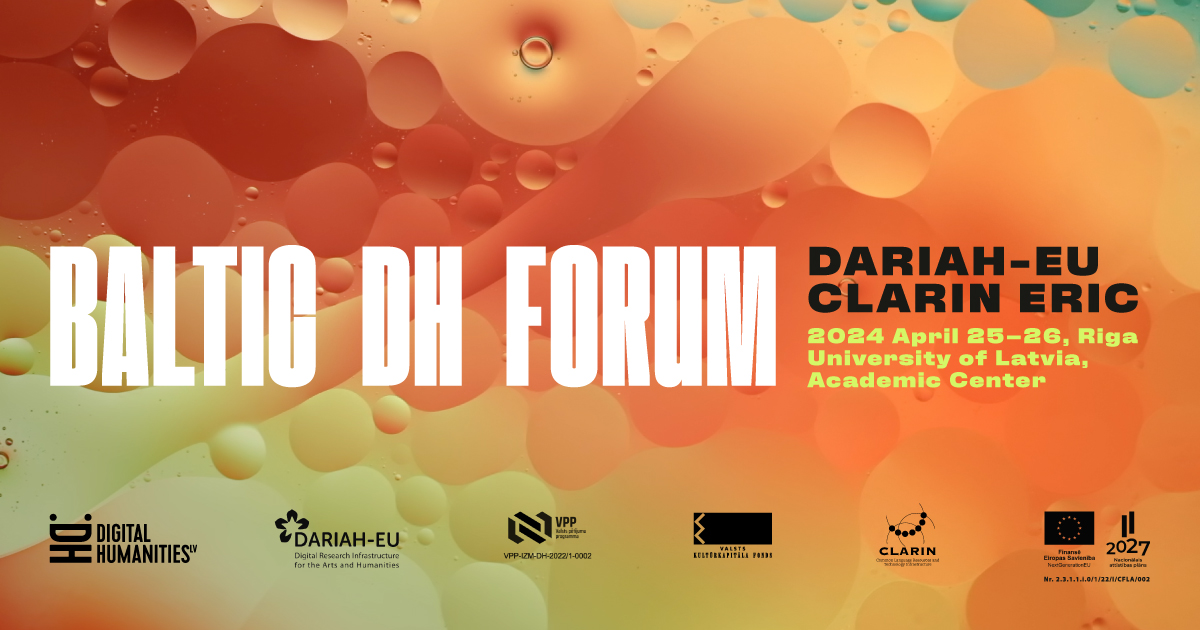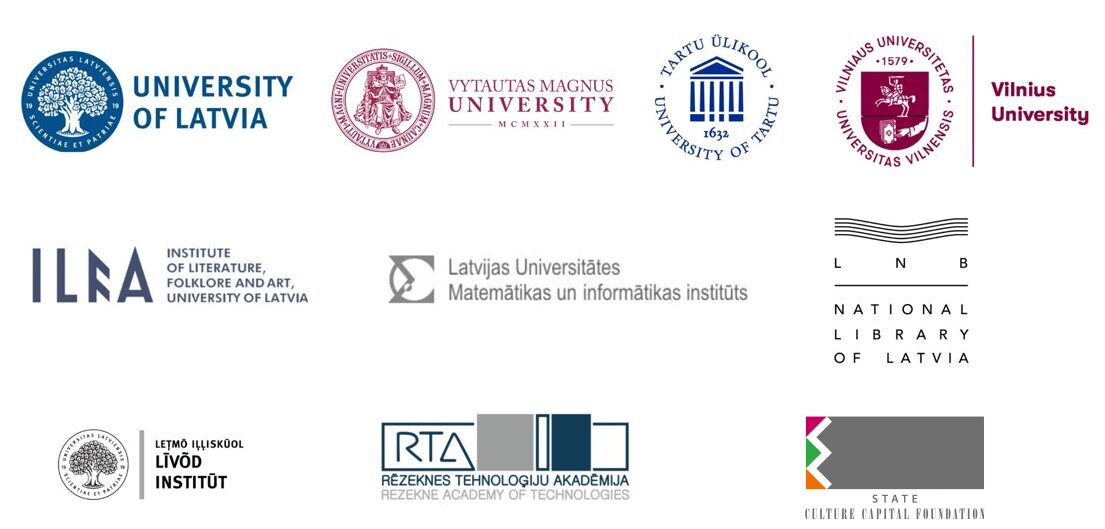
PROGRAMME PRACTICAL INFO 🔍 POSTER EXPLORER
For more photos, please click here.
Recording of Panel 1 and Panel 2, April 25, 2024,

PROGRAMME PRACTICAL INFO 🔍 POSTER EXPLORER
For more photos, please click here.
Recording of Panel 1 and Panel 2, April 25, 2024,
🗓️ When? – April 25–26, 2024
📍 Where? – In Riga
🆓 Participation Fee for presenters? – Absolutely None
⌛ Deadline? – January 25, 2024
🌐 http://www.digitalhumanities.lv/baltic-dh-forum-2024
Digital humanities have become a solid part of the research landscapes in the Baltic countries. Certainly, over the past decades, this transformation has been evident through the vibrant and enthusiastic DH communities, the emergence of new research groups and centers, and the increasing presence of digital humanities courses and programs in higher education. This marks the right time for the digital humanities communities of the three Baltic States to come together, to look at how and in what directions DH has developed in our countries, to reflect on what is relevant today and to project what lies ahead in the near future.
The Baltic DH Forum will take place for two days. The initial day will comprise three sessions featuring invited speakers from the Baltic DH research communities, Ministries, and prominent European digital humanities infrastructures, including CLARIN ERIC and DARIAH-EU. The second day is designed as a networking platform providing an opportunity to present DH projects, showcase developed digital resources and tools, and introduce educational initiatives.
To apply for participation in the Baltic DH Forum “Demonstration and Networking Session” (2nd Day), you are invited to submit an abstract of your presentation (200–250 words) in one of the following categories:
DH resource or tool
Project
Educational initiative, including training materials
Submissions are encouraged in diverse areas within digital humanities, including, but not limited to:
Computational linguistics and language technologies
Computational literature studies
Digital history and archaeology studies
Digital folklore studies and ethnography
Digital cultural heritage
Digital musicology
DH and endangered cultures and languages
Digital environmental humanities
Game studies and digital humanities
Citizen science and crowdsourcing
Submit your proposals by January 25, 2024. (Application process is finished)
Applications will be peer-reviewed by the programme committee, with the main criterion being relevance to the field of digital humanities.
During the “Demonstration and Networking Session” each presenter is expected to give a brief pitch talk (approximately 5–7 minutes) to the plenary audience, followed by discussions at the poster hall.
After the Baltic DH Forum, participants will be offered an opportunity to prepare a peer-reviewed publication for a special issue of The Baltic Journal of Modern Computing, Scopus and Web of Science indexed.
If you have any questions, feel free to contact us at [email protected] or [email protected].
🗓️ When? – April 25–26, 2024
📍 Where? – In Riga, the University of Latvia House of Science (Jelgavas Street 3, Riga)
⌛ Registration? – from March 26, 2024
🌐 https://www.digitalhumanities.lv/baltic-dh-forum-2024
Digital humanities have become a solid part of the research landscapes in the Baltic countries. Certainly, over the past decades, this transformation has been evident through the vibrant and enthusiastic DH communities, the emergence of new research groups and centers, and the increasing presence of digital humanities courses and programs in higher education. This marks the right time for the digital humanities communities of the three Baltic States to come together, to look at how and in what directions DH has developed in our countries, to reflect on what is relevant today and to project what lies ahead in the near future.The Baltic DH Forum will take place for two days. The initial day will comprise three sessions featuring invited speakers from the Baltic DH research communities, Ministries, and prominent European digital humanities infrastructures, including CLARIN ERIC and DARIAH-EU. The second day is designed as a networking platform providing an opportunity to present DH projects, showcase developed digital resources and tools, and introduce educational initiatives. Additionally, the Forum will host two specialised workshops. The first, on April 25th, will feature the Digital Research Infrastructure for the Arts and Humanities (DARIAH-EU), exploring its contribution to enhancing research in these fields. The second workshop, scheduled for the morning of April 26th, will focus on language technologies in higher education. It will highlight the Language Technology Initiative, a project coordinated by the University of Latvia, and discuss collaboration in higher education with language technology experts from Lithuania and Estonia. Read the latest press here.03.04.2024: Registration of attendees is open: https://forms.gle/UHU1pyA3J3hZtD6m7The number of attendee spots is limited, therefore please register if you truly intend to attend in person. Registration will remain open until all spots are filled. NB! On April 25th, the first two sessions will be available via live stream!
20.03.2024: Programme updated! https://www.digitalhumanities.lv/baltic-dh-forum-2024
04.03.2024: New venue!!! Both days of the Baltic DH Forum will take place in the University of Latvia Academic Center – the House of Science, Jelgavas Street 3. Check the map!
21.02.2024: Acceptance/rejection letters sent.
12.02.2024: Outline of the programme published here.
30.01.2024: The Baltic DH forum's application phase has concluded successfully, with a total of 55 participants/teams applying from across the Baltic countries and beyond. The peer-review process is set to begin this week, and results are scheduled to be announced around February 20th.
IMCS: Institute of Mathematics and Computer Science of the University of Latvia
NLL: National Library of Latvia
RTA: Rēzekne Technology Academy
UL DF: University of Latvia Faculty of Computing
UL LI: University of Latvia Livonian Institute
UT: University of Tartu
VDU: Vytautas Magnus UniversityVU: Vilnius University

